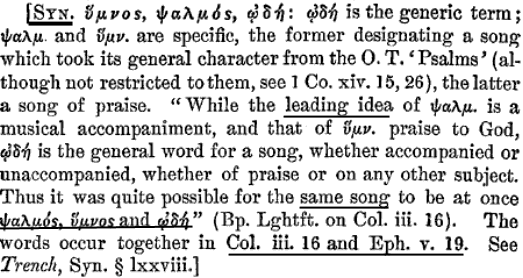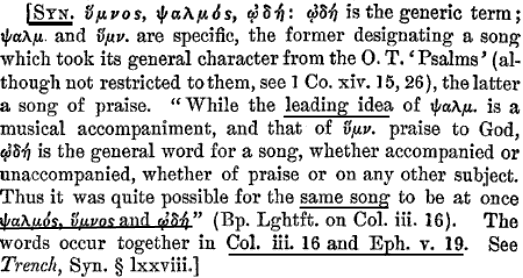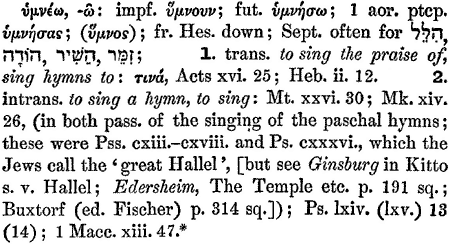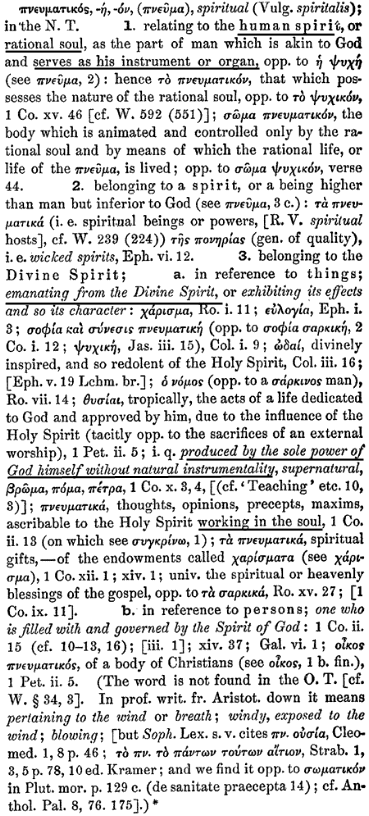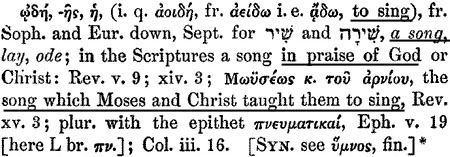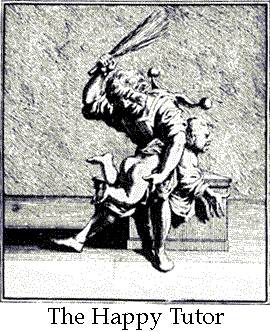--Mouseios , on, Aeol. Moisaios , a, on, (Mousa)A.of or belonging to the Muses, “hedra” E.Ba.410 (lyr.); Moisaion harma the car of Poesy, Pi.I.8 (7).67; lithos M. a monument of song, Id.N.8.47.II. musical, “kelados” AP9.372.
--Mousa , ēs, hē, Aeol. Moisa . Mōsa Alcm. 1, etc.; Lacon. Mōha (for Mōsa) Ar.Lys.1298, cf. An. Ox.1.277:—Muse,A.“Olumpiades M., Dios aigiokhoio thugateres” Il.2.491, cf. Hes.Th.25, etc.; nine in number, first in Od.24.60; named in Hes.Th.75 sqq.II. mousa, as Appellat., music, song, “m. stugera” A.Eu.308 (anap.); “euphamos” Id.Supp.695 (lyr.); “kanakhan [clanging, gnashing of teeth]. . theias antiluron mousas” S.Tr.643 (lyr.); “Aiakō moisan pherein” [LADED BURDEN] Pi.N.3.28; tis hēde mousa; what strain is this ? E.Ion757; “aluros m.” Id.Ph.1028 (lyr.); “dia mousas ēxa” Id.Alc.962 (lyr.): in Prose, “adein adokimon m.” Pl.Lg. 829d: in pl., mousai Sphiggos, of the Sphinx's riddle, E.Ph.50; esp. liberal arts, accomplishments, “tas mousas aphanizōn” Ar.Nu.972; “apaideuton tōn peri tas numphikas m.” Pl.Lg.775b: also in sg., “tēs alēthinēs m. ēmelēkenai” Id.R.548b; koinōnein mousēs ib.411c.2. hautē hē Sōkratous m. that was Socrates's way, Gal.UP1.9
Plato. Laws [775b] half that amount for the second, and so on in proportion, according as the valuation grows less. He that obeys the law should be praised by all; but he that disobeys the Law-wardens shall punish as a man of poor taste and ill-trained in the “nomes”1 of the nuptial Muses. Drinking to excess is a practice that is nowhere seemly2—save only at the feasts of the God, the Giver of wine,—nor yet safe; and certainly it is not so for those who take marriage seriously; for at such a time above all it behoves both bride and bridegroom to be sober, seeing that the change
1 Cp. Plat. Laws 700b, Plat. Laws 722d.
2 Cp. Plat. Laws 674a.
koinōn-eō 7. communicate, join, hē eruthra thalassa k. pros tēn exō . . Arist.Mete.354a2.
8. form a community, Id.Pol.1280a26, etc.II. of sexual intercourse, k. gunaiki, andri, Pl.Lg.784e, Luc.DDeor.1.2, 10.2
--apo implying departure from life, to live apart from a man or husband
3 of the mind, a. thumou away from, i. e. alien from, my heart, Il.1.562; “a. doxēs” 10.324; partitive, lakhōn a. lēidos aisan part taken from the booty, a share of it,
M. C. Kurfees by Tom
Burgess
All musical terms and names of instruments in the Bible point to Satan as the origin in a "worship" sense. He/she knew that man--whom she hated--was given an emotional hemisphere of the brain. If one hears a "saber toothed tiger" growl the rational brain SHUTS DOWN and the emotional side instantly prepares us to FIGHT or FLIGHT. We simply do not do "doubtful disputations."
The body creates chemicals such as endorphins which produce great anxiety. Satan knew that the identical impulses can be created by music which contains the same complex frequencies of a dangerous animal. By stimulating mankind with music she can prduce the bungee-jumping sensation. First, it is mortal fear but the drug high gives us a LIFT which she claims is a "spiritual" feeling which God and His rational Word does not manufacture.
ALL of the related words carry this destructive meaning to keep your eyes off Jesus and on the theatrical performing preacher, singers or musicians.
The ONLY references Burgess uses to associate Psallo which is a warfare word with MUSIC also point to older males PLUCKING the harp strings to groom a young boy used as the "ministers of the goddess" where sodomy was said to bind the flesh and spirit together. That is what all musicians claim knowing with Paul that "fools love to be fooled."
Paul in Romans 14 defines activities within our private world about which the church MUST NOT do "disputations" or dialogs or "sermonizing" because the ekklesia, synagogue or school of the Bible is directly commanded in Romans 15. The task of the "school of the Bible" is to teach disciples and not create spiritual anxiety which Jesus died to remove.
All of Paul's references to assemblies speak of TEACHING the Word and none of them engaged in "singing." That is why truth lovers hear Paul say TEACH or PREACH.
A. Ralph Johnson in Instrumental Music, Sacred or Sinful.
1. Tom Burgess in Documents on Instrumental Music reviewed. Psallo and Instrumental Music: Proofs do not prove anything but the "music-homosexuality" connection.
See more on Strabo's definition of the worship of Apollo or Abaddon or Apollyon: his MUSES are the locusts or musical performers in the book of revelation.
2. Tom Burgess More Review of Plutarch: if Psallo authorizes "church music" it authorizes a homosexual gathering.
3. Tom Burgess on Moralia confirms the "Music-Heresy-Perversion" connection which has no historical exception. 10/20/04
4. Tom Burgess on John Chrysostom: are the anti-instrumentalists ignorant rurals? 10/21/04 What about Paul and Martin Luther and John Calvin and Zwingli and--everyone who believed the Bible as authority.
5. Tom Burgess on Kurfees versus Thayer and Grimm: Quotes from: G. C. Brewer, A Medley on the Music Question, Gospel Advocate, Nashville 1948. Burgess uses the same Krewson arguments. LATEST 11/06/05
Charles Daily Northwest College of the Bible Part One ..... Part One A .....Part Two .... THRESKIA or CHARISMATIC
Walking by Faith is Not Walking by Sound: Music neither Teaches nor Admonishes: Music Universally Sows Discord. See Pamphlet
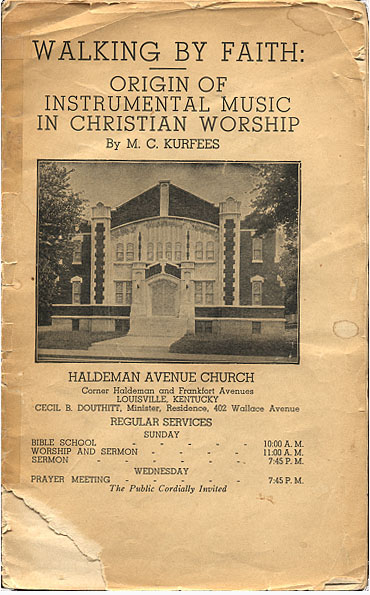
Tom Burgess: Before I present the evidence contained in Greek lexicons, I would like to quote a statement from M. C. Kurfees. It is found in Chapter II "Psallo as defined by the lexicons. "
"A careful survey of the field of evidence furnished by lexicographers of every grade has led the author to the decided conviction that there is not a solitary fact in all history touching the meaning of psallo which, considered in the light of its proper connection and bearing, can be legitimately used to sustain the practice of instrumental music in the worship of God under Christ. "4
4 Kurfees, M. C., Instrumental Music in the Worship, 1950. p. 7. Used by permission.
Burgess Page 26
Tom Burgess: I say with all sincerity and lack of malice that such a statement could only be made by a careful sifting of evidence furnished by lexicographers of every grade. Let the evidence speak for itself.
JOSEPH HENRY THAYER
Tom Burgess: We will first consider the much discussed lexicon of Grimm & Wilke, which has been translated, revised and enlarged by Joseph Henry Thayer. Thayer was professor of New Testament Criticism and Interpretation of the Divinity School of Harvard University. He is best known as the Secretary of the New Testament Company of translators for the American Standard Edition of the Revised Bible, 1901.
Example 9
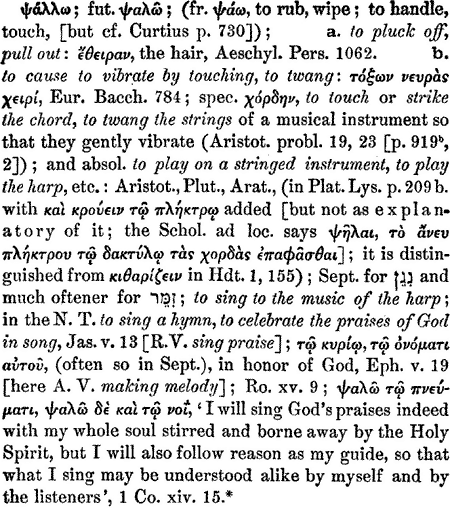
Before we go too far, it is important to note that not ALL that Thayer or anyone else lists for PSALLO is THE definition. Rather, since Thayer has no ancient lexicon to refer to he follows Grimm (Latin) and lists how the word is USED in the New Testament and other Greek literature.
For instance, the "mother" of the word is not spiritual worship with music but of warfare or wearing or rubbing a thing into a fine powder: to titurate. In our review of Burgess on PSALLO we list many of the equivalent words.
Jesus prepared SOP for Judas by grinding up bread, dipping it into the wine of the regular Passover which originated in Babylon and gave it to Judas. The devil then CAME INTO Judas and he became the devil's INSTRUMENT. The sop has the base meaning of Psallo.
Tom Burgess: A great deal of controversy has been raised over Grimm's phrase: "to sing to the music of the harp; in the New Testament to sing a hymn, to celebrate the praises of God in song.... " To those who oppose instrumental accompaniment, this phrase is undeniable evidence that Thayer says musical accompaniment was excluded in the New Testarnent.
I know of no one who quoted Grimm's LATIN material at the time of the great writers and debaters. They all knew about Grimm and probably others. However, Kurfees quotes Thayer who knew what no one could know to the contrary: unless you were shooting literall arrows, or plucking harps which most often meant shooting LOVE ARROWS, you were left with SHOOTING OUT HYMNS. See our review of A Ralph Johnson and more SHOOTING of songs or love arrows--unless you want to SHOOT the preacher with a dull flint.
Toxeuô to shoot with the bow, to shoot from a bow: metaph., to discharge, send forth, humnous
toxon (“-ou, -ō, -on; -ōn, -ois” (“i”), “-oisin”.) s.,1.bow: pl., arrows “argureō toxō polemizōn Phoibos” O. 9.32 “khruseois toxoisin hup' Artemidos” P. 3.10 “en polemō toxois apo psukhan lipōn” P. 3.101 “dmathen de keraunō toxoisi t' Apollōnos” P. 8.18 “elpomai mega eipōn skopou anta tukhein hōt' apo toxou hieis” N. 6.28 and so met. of the arrows of song, “epekhe nun skopō toxon, age thume” O. 2.89 “hekatabolōn Moisan apo toxōn” O. 9.5 of wine, “aexontai phrenas ampelinois toxois damentes” fr. 124. 11.
toxeuma arrow met. of song polla men artiepês [glib[ glôssa moi toxeumat' echei peri keinôn keladesai I. 5.47
kela^d-eō 2. [select] of persons, shout aloud, atar keladēsan Akhaioi, in applause, Il.23.869; “eme dei k.” Pratin. Lyr. 1.3, cf. B.l.c.; “keladeonti amphi Kinuran phamai
ki^nura [u^, hē, = Hebr.A.kinnor, a stringed instrument played with the hand, LXX 1 Ki.16.23; with a plectron, J.AJ7.12.3.
1 Samuel 16.23 It happened, when the [evil] spirit from God was on Saul, that David took the harp, and played with his hand: so Saul was refreshed, and was well, and the evil spirit departed from him.
Spiritus in Latin has the same literal meaning of wind or breath [ The breath of a god, inspiration, A haughty spirit, haughtiness, pride, arrogance] but because God had abandoned Israel to worship the starry host (and gave them kings in His anger) the word is widely used in the sense of
spīrĭtus spiritum Phoebus mihi, Phoebus [Abaddon, Apollyon] artem Carminis [music, enchantment] dedit, poetic spirit or inspiration, Hor. C. 4, 6, 29; cf an evil spirit
Hor. Od. 4.6
'Tis Phoebus, Phoebus gifts [spiritum] my tongue
Sweet tuner of the Grecian lyre,
Whose locks are laved in Xanthus' dews,
Blooming Agyieus! help, inspire
My Daunian Muse!
With minstrel art and minstrel fires:
Come, noble youths and maidens sprung
From noble sires,
carmen a tune, song; poem, verse; an oracular response, a prophecy; a form of incantation (cf.: cano, cantus, and canto). “per me (sc. Apollinem) concordant carmina nervis, “lyrae carmen, “harundineum,
“citharae liquidum carme With allusion to playing on the cithara barbaricum,”
pŏēta , a contriver, trickster, Cic. de Or. 2, 46, 194: “oratores et poëtae,” id. ib. 3, 10, 39: “versificator quam poëta melior,” Quint. 10, 1, 89:
per-cŭtĭo o strike through and through, to thrust or pierce through (syn.: percello, transfigo). o strike through and through, to thrust or pierce through (syn.: percello, transfigo). b. [select] To strike, play a musical instrument (poet.): “lyram,” Ov. Am. 3, 12, 40; Val. Fl. 5, 100.—1. [select] To smite, strike, visit with calamity of any kind (class.): “percussus calamitate, mălus spirit meaning EXORCISM
Pind. I. 5 In heroic times, too, fine warriors gained fame, and they are celebrated with lyres and flutes in full-voiced harmonies for time beyond reckoning. Heroes who are honored by the grace of Zeus provide a theme for skilled poets: .....
My swift tongue has many arrows, to shout the praises of these heroes. And now the city of Aias, Salamis, could testify that she was saved by her sailors in Ares' confrontation in the destructive storm sent by Zeus, [50] when slaughter poured like hail on countless men. Nevertheless, quench this boast in silence. Zeus dispenses both good and bad, Zeus the master of all. But such honors as these also welcome the joy of triumph, covered with the delicious honey of song. Let a man strive and contend
Clement: All honour to that king of the Scythians, whoever Anacharsis was, who shot with an arrow one of his subjects who imitated among the Scythians the mystery of the Mother of the gods, as practised by the inhabitants of Cyzicus,
beating a drum and sounding a cymbal strung from his neck like a priest of Cybele,
condemning him as having become effeminate among the Greeks,
and a teacher of the disease of effeminacy to the rest of the Cythians.Pi. I.2.3 Pindar, OdesIsthmian Odes
The men of old, Thrasybulus, who mounted the chariot of the Muses with their golden headbands,
joining the glorious lyre,
lightly shot forth their honey-voiced songs for young men,if one was handsome and had the sweetest ripeness that brings to mind Aphrodite on her lovely throne.
One might suppose that this is the ancient "law of silence." Because Thayer notes the uses of Psallo outside of the N.T. and then says:

Kurfees may have logically claimed that Thayer EXCLUDED instruments. If not INCLUDED then logically EXCLUDED. Because Thayer cannot find PSALLO used to include BOTH singing AND playing he makes a good decision. The fact that a HARP is used while SINGING does not mean that SINGING a Psalm INCLUDES a harp. One might smoke hashish as they usually did in the perverted musical rituals WHILE harping with their harps but HARPING does not include hashish. The prevailing literature notes that they often sodomized one another when made frantic by the flute-girls or male musicians: catamites. However, making melody does not INCLUDE sodomy or shooting people with real arrows or--as prophetic of Apollo's (Abaddon, Apollyon) end-time religion-- shooting love arrows.
So says M. C. Kurfees. Here, I have copied directly from Kurfees, page 47--48
2. The Glreek lexicon of Thayer which, by the unanimous testimony of modern scholarship, now occupies the very highest place in the field of New Testament lexicography, although specially devoted to New Testament Glreek, often gives the classical meaning of words. Accordingly, in harmony with the classical lexicons, as we have already seen, he says the word meant to pluck or pull, as the hair; to twang the bowstring; to touch the chords of a musical instrument, and hence to play instrumental music;
but, in citing authorities in confirmation of these meanings, it is a significant fact that he is compelled, with the other lexicographers, to go back to the same periods of the language prior to New Testament times to which they appealed for the same purpose, and he cites some of the same authorities cited by Liddell and Scott;
Kurfees is not to be pitied because no one can find any exception other than when singing WITH instruments belonged to the pagan religions. The Jews did not sing with instrumental accompaniment. The twang of a note was identical to the tone sung and gave extension to the spoken word. This might be as few as three notes to which you can chant but cannot truly sing.
And, those references always speak of music in connection with pagan religions where music and wine meant that they were drunk or 'piped down with wine' and were in the mood for sexual and homosexual "worship" which they believed bound the flesh and spirit together.
M. C. Kurfees: but when this prince of New Testament lexicographers comes to the New Testament period, he omits all of these meanings, and limits it to touching the cords of the human heart, saying that it means ``IN THE NEW TESTAMENT TO SING A HYMN, CELEBRATE THE PRAISES OF GOD IN SONG.
Burgess etal have excluded plucking hair because Grimm etal say that the generic word for PLUCKING applied to [but did not mean] plucking a harp string made of hair. However, psallo CANNOT be used to play a guitar with a pick or blow a flute [meaning to pollute or prostitute]. Why don't the musical discorders go back to using psallo to that meaning which EXCLUDED everying but plucking a string with the FINGERS--not with the plectrum?
By including blowing a flute--which Athene threw away because it seemed unseemly and obscene--Tom and his warrior band are left with violating the specific meaning of psallo to pluck ONLY with the fingers.
They are seen as obscene or war-like unless they use Thayer's remaining definiton meaning "in the N.T. to sing" only.
M. C. Kurfees: Then, as if to put an end to the controversy, the great lexicon of Sophocles, devoted exclusively to the Roman and Byzantine periods, and thus covering the entire period of New Testament and patristic literature, says he found not a single example of the word having any other meaning.
Because this writer has all of the important writings available on the computer in Greek [Including the Greek O.T.], Latin or English, I have not found a single exception to the Sophocles Rule.
Not even in the Biblical literature--available to all with eyes and ears-- will the ANTIS find a Hebrew word SAID to include a musical instrument used to define both SINGING and PLAYING. Of the king of Tyre as a type of Lucifer, Isaiah defines both Israel and Judah or Jerusalem [Sodom].
And it shall come to pass in that day, that Tyre shall be forgotten seventy years, according to the days of one king:
after the end of seventy years shall Tyre sing as an harlot. Isaiah 23:15The "song of the prostitute" is:
Take an harp, go about the city, thou harlot that hast been forgotten; make sweet melody, sing many songs, that thou mayest be remembered. Isaiah 23:16
M. C. Kurfees: We may now regard it as an established fact vouched for by the very highest lexical authority that in the course of centuries the term psallo [p. 49] underwent several complete changes in meaning, although, as we have already seen, its one radical idea, "to touch," runs through all its varied uses and applications; and that at the opening of the New Testament period, its ancient meanings, to pluck or pull the hair, to twang the howstring, and to touch the chords of a musical instrument, were as completely gone from the word as "to be happy" is now one from the word "silly," or "priate citizen" from the word "idiot."
Another notes (3) There is considerable evidence that psallo had no instrumental connotation even in other common Greek literature of the New Testament period. This is seen in the work of a Greek scholar named E.A. Sophocles, a native Grecian, and a professor of Greek language at Harvard University for 38 years. Sophocles was the author of A Greek Lexicon of the Roman and Byzantine Periods (from B.C. 146 to A.D. 1100). He examined 594 Greek authors (255 secular, 339 ecclesiastical) in the development of his lexicon. After this extensive survey, he defined psallo as meaning "to chant, sing religious hymns." He defined psalmos to simply mean "a psalm." Hence, he found no association of these terms with musical instruments in the common Greek of the considered period.
You can still pluck a harp string and make it 'sing' but the word pluck does not mean sing and make music.
Kurfees may be wrong but I have checked more resources than Thayer (probably) and Burgess is under the burden of finding PSALLO used of singing ACCOMPANIED BY AN INSTRUMENT.
Burges picks up again on page 27 and takes exception to the Kurfees text in bold:
Tom Burgess: It is hard to believe that such a statement could be made after "a careful survey of the evidence. " Even casual observation shows that there are at least three major points which are false in that conclusion
A. This phrase, often ascribed to Thayer is not Thayer's at all but Grimm's. (We will demonstrate this later.)
B. Thayer himself, makes such an interpretation of that phrase wholly untenable and obviously contradictory to his clearly defined definition which we find in his discussion of the synonyms, psalmos, hymnos, and ode.
C. Grimm does not limit his New Testament definition to the touching of the chords of the human heart. Not only does he not limit it to that, HE DOES NOT EVEN MENTION IT under his definition of psallo! Please examine example 9.
Let us examine these points more closely, one at a time.
A. For over fifty years brethren have been quoting Grimm and calling him Thayer! lf you will notice under Grimm's discussion of the psalmos, Thayer concluded it by saying, "[Syn, see hymnos, fin]" 6[fin, means at, or near the end. T. B] Example 10 reproduces this discussion of synonyms under hymnos.
Example 10
